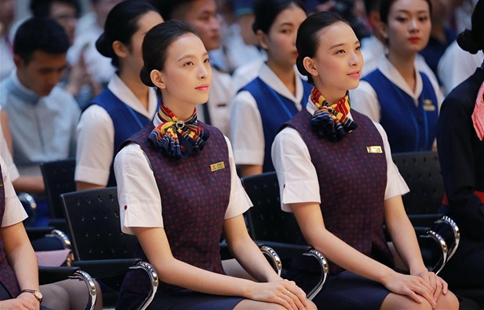PARIS, June 17 (Xinhua) -- The success of French President Emmanuel Macron's movement, the Republic on the Move (LREM), in the first round of legislative elections on June 11, is undeniable in terms of percentage of votes cast.
All opinion polls predict a new record for abstention rates for the second round on Sunday.
The debate on the causes and consequences of such low turnout has created concerns in France and raise questions about this way of voting, as well as the legitimacy of the future National Assembly.
On June 11, more than one in two French voters stayed home, leading to the lowest turnout for the first round of legislative elections in the history of the 5th Republic.
According to the Ministry of the Interior, the rate of abstention was at 51.29 percent, 8 percentage points higher than in 2012 (42.8 percent), and 29 percentage points higher than the first round of the presidential election (22.2 percent).
Opinion polls are predicting a new record for the second round, after which the 577-seat National Assembly will be receive a complete makeover.
According to an Odoxa poll for France Info, published Friday, 53 percent of potential voters plan not to go to the polls. If the victory of LREM, founded in April 2016 by then-candidate Macron, comes as a landslide, the "first party in France" will still be of abstention.
"Even if LREM prepares to gain a large majority, it is a strong deformation of the reality of French society. In the end, only a small part of the electorate has voted for LREM, due to weak turnout," said Yves-Marie Cann, director of political studies at the Elabe-CSA polling institute.
"The new majority should not make the mistake of believing that voters have given them a blank check. They were rather lucky there wasn't strong mobilization against them. They are also benefiting from the goodwill which surrounds Emmanuel Macron, especially on his first international actions which were well-received," he said.
"Mechanically, this strong abstention should be favorable to LREM, whose base is more mobilized. But the other side of the coin, it's to find oneself with a badly elected National Assembly," the pollster summarized.
The inversion of the election calendar is often mentioned by pundits to explain the abstention rate.
Since the 2001 reform which placed the two legislative rounds in the immediate aftermath of the presidential election, when the term of the head of state was set at five years, the level of abstention during legislative elections has only increased and the vote functions more like a confirmation.
"The presidential election is the only one, in our system, which is mobilizing," said Jean-Yves Dormagen, political science professor at Montpellier University.
A whole series of factors have contributed to the abstention record set on June 11.
The electoral sequence, which began in autumn 2016 with the primaries on the right, has probably contributed to a "democratic weariness" among voters, along with the growing defiance toward the political class which only worsened during a campaign riddled with scandals.
The very poor turnout is also a disavowal of politicians.
According to the poll published Friday, 27 percent of abstainers said they will not vote because they think the election is rigged beforehand and that Macron's movement will win, and 24 percent because they don't identify with the programs and personalities of the candidates. Paradoxically, 6 out of 10 think a large majority for the LREM in the National Assembly would be a bad thing.
"The French who are not pro-Macron -- and they are numerous -- are stunned," argued the political science PhD Virginie Martin, who teaches at the Kedge Business School.
"The wish to clean house and the protest on which Marine Le Pen capitalized also benefits Emmanuel Macron. Even the people, right or left, who didn't vote for him are almost content because they see the candidates from the system getting ejected," she added. "In these conditions, the question of the basis of legitimacy is more real than ever."
This question of legitimacy has become more urgent as voting procedures for electing the National Assembly are regularly criticized.
"While a group like On the Move represents 15 percent of the electoral body but will obtain 75 percent of the seats, it's because there is a problem," said Christian Delporte, author and specialist in political history.

















